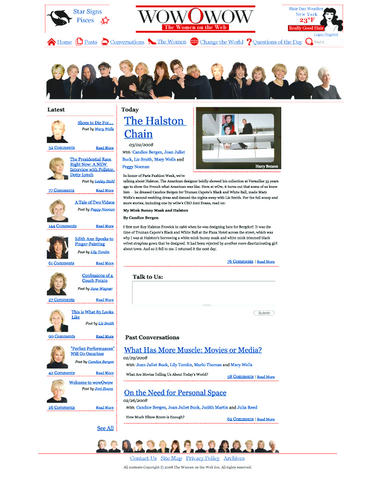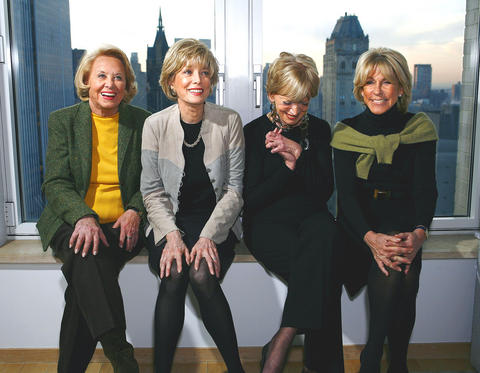It was another season of fashion runway shows and a group of friends, chatting about the revival of Halston, were reminiscing about their personal encounters with the designer. Candice Bergen shared how he had lent her a white mink bunny mask and strapless gown for Truman Capote's 1966 Black and White Ball. Liz Smith spoke of how cocaine had destroyed the man during the disco era. Joni Evans admitted to attending a party and gushing to "Calvin Klein" about how she adored his designs, only to realize that she was gushing to Halston.
Their conversation might have taken place over lunch at Le Cirque. Only this was a virtual Le Cirque: The memories spilled forth not from lipstick-ringed mouths, but from BlackBerrys, iPhones and laptops before being posted on WowOwow.com, a new Web site aimed at women 40 and older.
The site's five founders, also women of a certain age, are longtime friends and media live-wires: Evans, formerly the president of Simon & Schuster and an ex-publisher at Random House; Smith, the gossip columnist; Mary Wells, the advertising executive behind memorable campaigns like I Love New York; Peggy Noonan, the political columnist and former presidential speechwriter; and Lesley Stahl, the television news reporter. In addition, the founders have signed up some boldface friends to contribute to the site, including Bergen, Joan Juliet Buck, Whoopi Goldberg, Marlo Thomas, Lily Tomlin, Joan Cooney, Judith Martin, Sheila Nevins, Julia Reed and Jane Wagner. WowOwow, which is to make its debut on Saturday, was but a pixel of an idea a year ago.

PHOTO: NY TIMES NEWS SERVICE
Evans was struck by what she considered a dearth of online content provocative enough to hook sharp, driven women like herself. Weary of shopping and travel sites, she reached out to a klatch of female friends who are as blond as Jayne Mansfield and better connected than the most determined Facebook users. Turns out, they were game for shaking up the digital status quo, even though most were cyber neophytes. Web culture, from the technicalities of uploading content to the verbal nakedness that is blogging, was unfamiliar. Even acquiring a domain name was, as Smith put it at a gathering of some of the founders the other day, an uphill battle.
Somewhere Evans has a long list of thumbs-down domain names (ie, HerTube.com). "I remember how innocent we were," she said. The name they settled on is a play on Women on the Web.
"We actually bought out a porn site to get this name," Evans said. (Technically, they didn't buy a porn business, just womenontheweb.com.) Now, "when anyone looks for that porn site, they're directed to us," said Evans, who became chief executive of the site after retiring last year as a senior vice president at the William Morris Agency's literary department.

PHOTO: NY TIMES NEWS SERVICE
The fare on the new PG-13 WowOwow is in some ways no different than that of other women-focused community Web sites like iVillage: horoscopes and posts about love and marriage, health and fashion. WowOwow also has political commentary, but what is particularly distinctive are the conversations, like the Halston dialogue, which read like deeper and more intimate versions of the Hot Topics segment of the television gabfest The View.
"It was very loose and fun and intimate," Bergen said of participating in the discussions, which the women have practiced while the site is in beta mode. The cozy tone of the exchanges, the participants say, reflects their decades-long overlapping friendships, stretching back to the 1960s and 1970s when many were among the first women pioneering their media and entertainment fields.
"It's like when I used to live in a women's dormitory 50 years ago," said Martin, aka the advice columnist Miss Manners.
Going up against thriving well-established destinations like iVillage or More will be no small task. WowOwow's chief appeal may be the glimpse it promises into the personal lives and beliefs of a group of businesswomen who broke through glass ceilings. The site fundamentally trades on their celebrity and sophistication. "IVillage has always puzzled me," said Buck, a contributing editor to Vogue and a consulting editor to WowOwow. "I love the idea but it's like Macy's or something."
The women contribute their own blog posts or musings whenever the mood strikes. Most send e-mail messages although Smith has been known to call in or fax her contributions. "Well, I still write with a feather you know," she said.
WowOwow also hopes to be shaped by readers, who can post comments if they register. The "Intuitive" who writes the horoscopes will take daily questions. There are plans for a philanthropic section of the site and a social networking component where readers can create personal home pages and interact with one another.
Statistics show there is a market for such a site. A comScore Media Metrix study of the growth in visitors among the top 100 US Internet properties found that women's community sites were, along with political sites, the top gaining Internet category last year. Unique visitors to women's community sites reached nearly 70 million in December last year, a gain of 35 percent over December 2006. Glam Media and iVillage, the reigning properties in this category, both benefited from the increased traffic.
The start-up investment in WowOwow is US$1 million; the five founders, who are equal partners, backed it with their own money. They have also secured some advertisers, Tiffany, Citi and Sony, and hired five full-time employees who, as Buck put it, "speak cyber."
Still, Evans and company are not necessarily an Internet dream team. They may be coming a bit late to the party. And they have large public personas, which may make it challenging for them to be uninhibited enough to lure readers accustomed to bloggers who never censor themselves.
The medium is alluring to Evans and other WowOwow writers, they say, because it offers a respite from their more structured assignments. Even so, why migrate to cyberspace after long, successful and lucrative careers in other fields?
"It is a young world on that Web, and it's time that a mature or seasoned or empowered generation had a strong presence," Evans said, "and not one about finding a man or about matchmaking or about taking care of your daughter," she added.

On April 26, The Lancet published a letter from two doctors at Taichung-based China Medical University Hospital (CMUH) warning that “Taiwan’s Health Care System is on the Brink of Collapse.” The authors said that “Years of policy inaction and mismanagement of resources have led to the National Health Insurance system operating under unsustainable conditions.” The pushback was immediate. Errors in the paper were quickly identified and publicized, to discredit the authors (the hospital apologized). CNA reported that CMUH said the letter described Taiwan in 2021 as having 62 nurses per 10,000 people, when the correct number was 78 nurses per 10,000

As we live longer, our risk of cognitive impairment is increasing. How can we delay the onset of symptoms? Do we have to give up every indulgence or can small changes make a difference? We asked neurologists for tips on how to keep our brains healthy for life. TAKE CARE OF YOUR HEALTH “All of the sensible things that apply to bodily health apply to brain health,” says Suzanne O’Sullivan, a consultant in neurology at the National Hospital for Neurology and Neurosurgery in London, and the author of The Age of Diagnosis. “When you’re 20, you can get away with absolute

May 5 to May 11 What started out as friction between Taiwanese students at Taichung First High School and a Japanese head cook escalated dramatically over the first two weeks of May 1927. It began on April 30 when the cook’s wife knew that lotus starch used in that night’s dinner had rat feces in it, but failed to inform staff until the meal was already prepared. The students believed that her silence was intentional, and filed a complaint. The school’s Japanese administrators sided with the cook’s family, dismissing the students as troublemakers and clamping down on their freedoms — with

As Donald Trump’s executive order in March led to the shuttering of Voice of America (VOA) — the global broadcaster whose roots date back to the fight against Nazi propaganda — he quickly attracted support from figures not used to aligning themselves with any US administration. Trump had ordered the US Agency for Global Media, the federal agency that funds VOA and other groups promoting independent journalism overseas, to be “eliminated to the maximum extent consistent with applicable law.” The decision suddenly halted programming in 49 languages to more than 425 million people. In Moscow, Margarita Simonyan, the hardline editor-in-chief of the